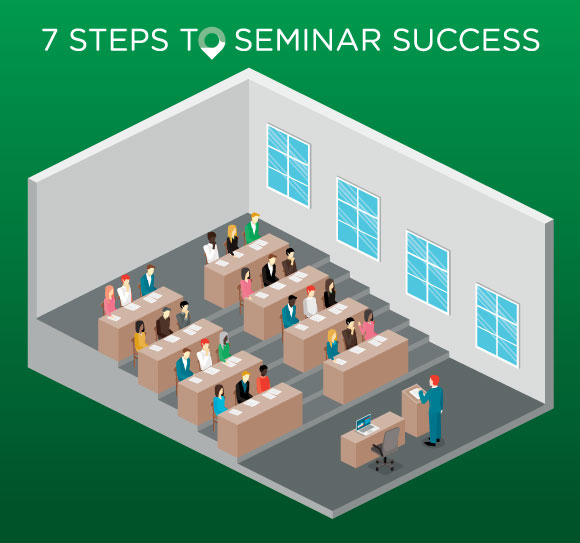
Many people are hungry for financial information they can trust. Financial seminars are a great tool to get in front of these people, but planning and executing a successful seminar can be a lot of work.
Covisum® is dedicated to helping advisors and their clients create a shared vision for the future. We understand that it is easier for a client to stay on their current path, rather than create a new one. However, with the right plan, you can help prospective clients as well as grow your business.
One way to grow your business is to host a seminar and position yourself and your firm as trusted advisors. In my role as a Certified Financial Planner™ at Sequent Planning, I’ve been using seminars successfully to build business for a number of years.
So, what does it take? Follow these seven steps to a successful financial seminar:
Step 1: Selecting the right seminar topic
What’s the key ingredient in selecting a seminar topic? Ask yourself: How can you add value to your client’s life based on something they believe they understand, like when to claim Social Security benefits or harvest from other income streams, but tend to make poor decisions about?
Your seminar topic needs to be impactful and important to the audience’s financial well-being — topics such as transitioning to retirement, making smart Social Security decisions, retirement income planning, managing taxes in retirement and managing investment risk during retirement.
Step 2: Focused versus broad
Select a focused topic for your seminar. It works better than a “broad brush” approach. Your goal is to help participants challenge prior assumptions about topics like Social Security or planning for retirement. Focus on presenting a decision-making framework, how to solve a problem. Misunderstanding or bias about how something works often causes poor financial decisions to be made.
We’ve been running a seminar series each year covering a range of topics with the goal of using these educational sessions as part of our overall efforts to build our firm’s brand in the local marketplace. This might cause us to sacrifice some short-term revenue, but we have found the long-term benefits of this philosophy have paid off for the growth of our business.
Step 3: Define your objectives for the financial seminar
Educating participants is our primary objective when hosting a seminar. Host your seminar in educational setting, such as a local library or university.
We’ve found that when you educate, only half the room wants to learn about the topic. The other half wants to know if they are doing it right on their own and decide if they should outsource dealing with their financial issues to an expert.
It’s important to note, the goal of the seminar is not to make sales. The seminar is a vehicle that will help make sales, but this event is neither the time nor place for a sales pitch. Focus on education and positioning yourself as a subject matter expert or industry influencer and you’ll do yourself, and your prospective clients, a favor.
Step 4: Find a strong partner
As important as your seminar topic might be, I’ve found that finding a strong partner has also been a key factor in the success of our seminar initiatives over the years.
We started off partnering with a local university, and our first seminar was presented in conjunction with a member of the faculty. Besides the professor being very knowledgeable and an excellent speaker, this partnership gave us credibility that doing a dinner seminar just doesn’t provide.
We currently partner with our local public library system. In addition to being a well-known entity in the community, the library plays a big part in publicizing our seminar series, ultimately impacting our success.
Step 5: Selecting the right venue
We’ve found that hosting a seminar in a neutral, educational setting adds impact to the impression that we are trying to cultivate.
This isn’t to say that successful seminars can’t be held in other types of venues, but I suggest giving this aspect of planning your financial seminars the attention that it deserves. How does the venue work with the message you are sending? Does it portray the image of your firm that you are trying to convey?
Step 6: Marketing the seminar
Our marketing is simple. We send out one piece of mail listing the 25 to 30 seminar sessions that we will be putting on over the course of the year to our list of about 6,000 people. That is the extent of promotion of our sessions. Clearly, we have the advantage of being known in the community because we’ve done these sessions for several years now. We also have an advantage in our partner, the library system because they promote our sessions as well. Read more on generating the right leads for your practice.
Initially you may need to do more in terms of promoting. You will certainly want to mention the sessions on your website, your firm’s Facebook page and any type of newsletter or client/prospect communications you do. Learn more about marketing strategy for financial advisors.
Step 7: Following up
We don’t ask attendees to sign in. Instead, we offer a free consultation and put the onus on the attendees to contact us. This way we only expend our energy on qualified leads — those who have opted in.
Next, we will follow up twice — and only twice. We are very conscious about coming across as trusted professional advisors and not sales people.
I’ve found that about a third of the attendees will request a follow-up after each session. It’s important that you are able to handle the potential level of follow-ups that you expect to receive. As you gain experience with conducting these sessions, you may want to scale the number of attendees to the level of expected follow-ups to ensure that you can serve your prospects in a timely fashion, giving them the professional experience they deserve.
What’s Next?
Seminars can be an excellent business-building tool if planned and executed correctly. When you position your seminars as educational and you partner with the right venue, you set yourself up for success. To execute the seminar effectively, you need to carry the educational tone — without sales pitches — to start building your firm’s brand as experts and trusted advisors.
Last year, our firm conducted 25 seminars with an average of 15 attendees per event. Each seminar, on average, generates one to two initial client consultations (although it is not uncommon for us to hear from additional attendees several months, even years, later). We ended the year with 16 new planning clients and 19 new investment clients as a result of our financial seminar efforts. Want to know how we convert seminar prospects into clients? Download our first meeting checklist.






